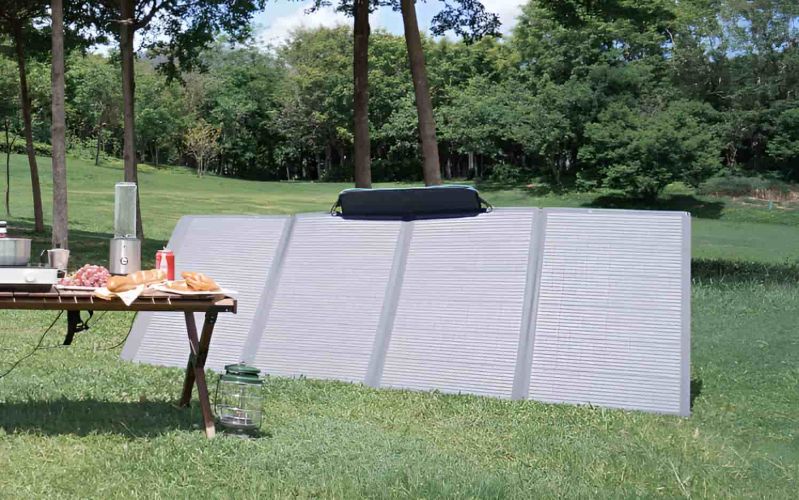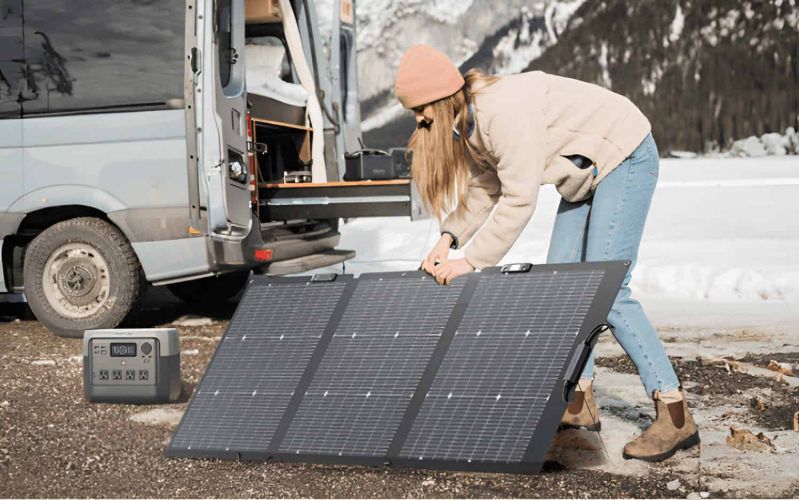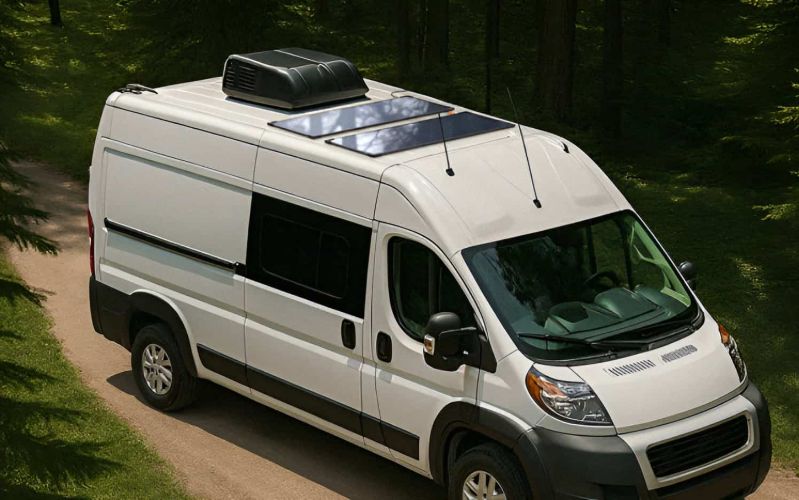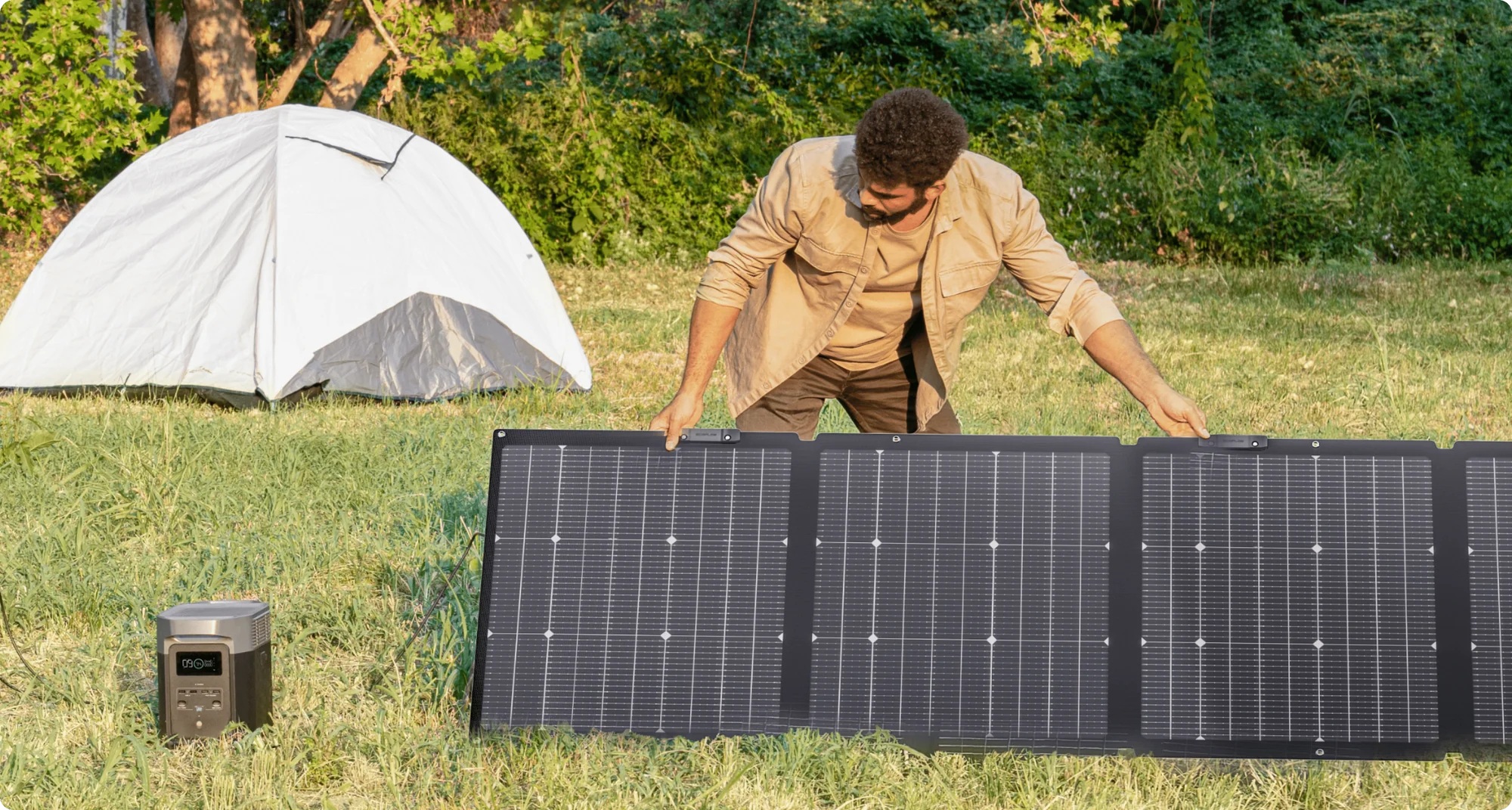Most Efficient Solar Panels: Best Picks for 2025
Before installing solar panels on your roof, it’s essential to understand that not all solar panels work the same and can't be expected to yield the same results. Particularly, you have to think about efficiency as a key factor when choosing one. Solar panels vary in the way they capture and convert sunlight into electricity, which directly affects how much energy your home can generate.
In the UK, where weather conditions can limit sunlight and roof spaces are often tight, investing in solar panels with high efficiency is the best decision you can make. This guide will help you understand how solar panel efficiency works, introduce the most efficient solar panels for 2025, and provide tips for buying, installing, and maintaining solar panels.
Solar Panel Efficiency Explained
When looking for the most efficient solar panels, you will often come across the term “efficiency” when comparing options. This efficiency shows how well your chosen panel can turn sunlight into usable electricity, affecting how many panels you will need to meet your needs. Understanding this will help you find the right system that best matches your space and lifestyle.
What Does Solar Panel Efficiency Mean?
Think of solar panel efficiency as the secret ingredient that decides how much power you get from the sunlight hitting your roof. If a panel has a 24 percent efficiency, it means it converts 24 percent of the sunlight it captures into electricity, while the rest is lost as heat or reflected away. This number isn’t random. It’s calculated under controlled conditions, so you can compare panels fairly before making a decision.
Efficiency depends heavily on the type of cells and technology used in the panels. Traditional panels like polycrystalline panels usually offer lower efficiency, around 15 to 17 percent, while monocrystalline panels, which are common in the most efficient PV solar panels, often reach above 20 percent due to their higher purity and advanced structure.
Then there’s the recent cutting-edge techs or developments: PERC cells that bounce light back for a second chance at conversion, heterojunction cells that blend technologies for better performance, and N-type cells that resist degradation over time. They are the reasons some of today’s panels can push 23 to 25 percent in lab tests, reshaping what you can expect from solar panels.
But here’s where it gets real. The UK’s weather, your roof angle, and seasonal changes will influence how your panels perform each day. That’s why choosing the most efficient solar panels is about resilience. Efficiency is the difference between panels that merely exist on your roof and panels that actively work for you, helping you lower your bills and secure consistent energy.
Factors That Affect Solar Panel Efficiency
Choosing the most efficient solar panels requires knowing what impacts their performance and longevity. Here are the factors that will help you maximise your investment while ensuring your solar system remains reliable in the long run:
Type of Solar Cells
Solar panels are made using solar cells that capture sunlight and convert it into electricity. The type of cell used in your panels plays a role in efficiency. Monocrystalline panels are more efficient than polycrystalline panels and thin-film panels due to their higher purity and design. Advanced technologies like PERC and N-type cells have further enhanced efficiency and performance.
Temperature Coefficient
When solar panels get hotter, their ability to produce electricity slightly decreases. The temperature coefficient tells you how much a panel’s output drops as its temperature increases. Solar panels work best at around 25°C based on standard test conditions. For every degree above this, panels lose a small percentage of their output. This small percentage is called the temperature coefficient.
For example, if a panel has a temperature coefficient of -0.3% per °C, it will lose 0.3% of its efficiency for every degree above 25°C. So, if your panel’s surface temperature rises to 35°C, the panel would lose 3% of its efficiency (10°C x 0.3%). In simple terms, a lower or less negative temperature coefficient means better performance on warm days.
Light Absorption and Reflection
Solar panels can lose potential energy when sunlight reflects off their surface instead of being absorbed. Panels with anti-reflective coatings and textured surfaces absorb more sunlight and reduce loss from reflection. This technology is crucial in the UK climate, where cloudy days are common. The most efficient solar panels often use these technologies for consistent output.
Shading and Installation Angle
Shading from trees or buildings can reduce efficiency. Panels with built-in bypass diodes allow electricity to flow around shaded cells, thus minimising energy loss. Installation angle also plays a role in efficiency. Ensuring the right installation angle and south-facing orientation maximises sunlight capture. A professional assessment can help you optimise your panel positioning.
Maintenance and Cleaning
Dirt, debris, and snow can block sunlight and reduce energy output. Regular cleaning and inspections can help maintain the most efficient solar panels in top condition. This ensures your panels continue to generate power efficiently over time. It also helps extend your solar system’s lifespan while protecting your investment.
Factors to Consider When Choosing the Right Solar Panel for Your Home
To help you select among the most efficient solar panels, consider the factors listed below to ensure you find the right one for your needs. Considering these factors ensures your system aligns with your household’s goals and supports reliable energy generation.
1. Efficiency Over Cost
The most efficient PV solar panels in the UK may have a higher upfront cost, but they generate more power over time. It means your return on investment will outweigh the cost. This leads to long-term benefits like lower bills and maintenance costs. Panels with high efficiency often also come with better warranties. It is worth considering if you want to maximise savings.
2. Available Roof Space
Assess your available roof space before purchasing your system. The most efficient solar panels allow you to generate maximum energy in smaller spaces. If each solar panel has a high conversion rate, you will need only a few panels to install. Fewer panels reduce system complexity and installation time. This is practical if you’re aiming for high output but have limited space.
3. Durability and Warranty
Look for panels with strong warranties and durable materials, ensuring they can withstand the UK climate. The most efficient solar panels typically come with warranties of 25 years or more. The bifacial solar panels are also the most efficient models as they can still generate more power even when the sun is less intense. It ensures your system delivers consistent energy over time.
4. Energy Needs and System Size
Consider your household’s current and future energy needs when choosing panels. If you have higher energy use, the most efficient solar panels can generate enough electricity with fewer panels. They can also support your usage if you plan to add electric vehicles or heat pumps in the future. It also helps you reduce dependence on the grid while promoting sustainability goals.
Top 5 Most Efficient Solar Panels for 2025
If you’re interested in investing in the most efficient solar panels but feel overwhelmed about what to buy, below are the best recommendations from EcoFlow that you can consider for your home or mobile use. These top-performing models deliver high conversion rates and features promising qualities like portability.
1. EcoFlow 400W Portable Solar Panel
The EcoFlow 400W Portable Solar Panel offers high conversion rates of up to 23 percent, making it one of the most efficient solar panels in the UK for those who need reliable energy on the go. Its foldable and lightweight build ensures easy transport and quick setup wherever you need power. This panel is waterproof with an IP68 rating for added durability.

Efficiency: 22.60%
Cell Type: Monocrystalline Silicon
Key Features:
Works with EcoFlow portable power stations
Charge faster with high 400W solar input
Durable, multi-layered materials
Self-supporting with an adjustable angle
IP68 waterproof rating
2. EcoFlow NextGen 160W Portable Solar Panel
The EcoFlow NextGen 160W Portable Solar Panel is among the most efficient flexible solar panels designed for those with limited space or mobile needs. It uses monocrystalline silicon cells to deliver reliable performance during various weather conditions. Its compact and foldable structure makes it easy to transport and store. It offers stable output while you’re camping outdoors.

Efficiency: 25%
Cell Type: N Type TopCon Monocrystalline Silicon
Key Features:
Works with EcoFlow portable power stations
30-60° adjustable stand
Integrated solar angle guide
Lightweight and compact
IP68 waterproof rating
3. EcoFlow 130W RVMax Rigid Solar Panel (2 pieces)
The EcoFlow 130W RVMax Rigid Solar Panel (2 pieces) exceeds the most efficient PV solar panels in the market with a conversion current efficiency rating of 25%. It’s perfect for those seeking a stable installation on RVs or home rooftops. It’s made of premium TOPCon solar cells for efficiency. Its rigid design ensures the panels stay securely mounted during travel or harsh weather.

Efficiency: 25%
Cell Type: N Type TopCon Monocrystalline Silicon
Key Features:
Works with EcoFlow portable power stations
Tailored for RV use
12 mm ultra-thin panel to reduce driving wind resistance
Connect up to 10 panels in parallel (1300W)
NEW LFB-40 port with enhanced stability
4. EcoFlow 520W Rigid Solar Panel (2 pieces)
The EcoFlow 520W Rigid Solar Panel (2 Pieces) system is ideal for you if you’re seeking the most efficient solar panels UK for higher energy needs. It uses advanced monocrystalline technology to ensure excellent conversion rates. The panels are designed for permanent installations, delivering consistent power even during the UK's changing seasons.
Efficiency: 24.8%
Cell Type: N Type
Key Features:
Works with EcoFlow portable power stations
IP68 dust and waterproof rated
App control management
Easy DIY mounting
Multi-mounting options
5. EcoFlow NextGen 220W Bifacial Portable Solar Panel (Refurbished)
The EcoFlow NextGen 220W Bifacial Portable Solar Panel (Refurbished) is one of the most efficient solar panels designed to capture sunlight from both sides for higher overall energy production. Its portable and foldable design makes it ideal for those seeking flexibility without sacrificing performance. It is waterproof, making it suitable for different conditions across the UK.

Solar Panel Installation and Maintenance Tips
After choosing the most efficient solar panels, correct installation and care will help you maximise their efficiency. Maintaining your solar panels ensures you get reliable output while extending their lifespan. Here are installation and maintenance tips to consider:
1. Hire Certified Installers
Work with certified solar installers to ensure your system is safe and efficient. Professional installers also help you comply with UK regulations. They will ensure all wiring and components are safely installed to prevent inefficiencies. Proper installation also protects your warranty. It provides peace of mind that your system will perform optimally.
2. Position Panels Correctly
Panels should be installed at the correct angles for your location to maximise sunlight capture. In the UK, south-facing panels are ideal for consistent sunlight exposure. Avoid shaded areas to prevent output loss. Trim branches and monitor any new buildings that could create shade on your panels. Using microinverters can help mitigate shading issues when unavoidable.
3. Clean Panels Regularly
Dust, bird droppings, and debris can reduce the performance of your most efficient PV solar panels. Cleaning your panels with water and a soft cloth helps keep them clear for maximum sunlight absorption. Avoid harsh chemicals that can damage the protective layer. Regular cleaning ensures your panels operate at their best.
4. Your System's Output
Use monitoring systems to track how much electricity your most efficient solar panels are generating. If you notice drops in performance, it may indicate issues needing quick intervention. Monitoring helps you identify shading or system faults early. This helps keep your energy generation consistent.
Conclusion
Investing in the most efficient solar panels is a strategy for maximising your home’s energy generation. It helps reduce your bills while supporting a low-carbon future. Choosing the right panels, understanding the factors that affect performance, and maintaining your system are all essential steps to protect your investment. Efficiency is the quiet force that works for your home power needs day after day, even when you are not watching. As your system gathers each ray of light, it shapes a future where your home is less dependent on the grid.
FAQs
What is the most efficient solar panel?
The most efficient solar panels typically utilize advanced technologies like N-type TOPCon monocrystalline silicon, which helps achieve high conversion rates of sunlight into electricity. Among the top performers are EcoFlow’s solar panels, such as the EcoFlow NextGen 160W Portable Solar Panel, with a 25% efficiency rate. Efficiency is essential because it directly impacts how much power you can generate from each panel. Monocrystalline panels, which are known for their purity and design, generally outperform polycrystalline panels. For those seeking the highest performance, models using bifacial technology—capturing sunlight from both sides—also push efficiency to new levels. In 2025, solar panels with efficiency ratings above 20% are considered top-tier, offering better performance in limited space, especially in regions like the UK with fluctuating sunlight.
Are there 1000W solar panels?
While 1000W (1kW) solar panels do not exist as single units, systems that collectively provide 1000W are common. Solar panels typically come in smaller wattages, ranging from 100W to 400W for individual units. However, multiple panels can be connected in series or parallel to form a solar system that produces a total of 1000W or more. For example, a 250W panel would require four units to reach 1000W. These systems can be scaled up further to meet larger energy needs. A 1000W system is often used in residential or commercial solar installations and is capable of generating enough power to support small appliances, lighting, or partial home energy requirements. Such setups are particularly effective for users with limited roof space or energy needs.
Will a 100W solar panel run a fridge?
A 100W solar panel is unlikely to run a standard fridge on its own for any significant period. While the panel may provide some power to operate a smaller, energy-efficient mini-fridge, it’s generally not enough to power a full-sized fridge. Fridges require continuous power, and even the most energy-efficient models often consume around 100 to 200 watts per hour, with peaks of up to 600W when starting up. To run a fridge, you would need a larger solar setup—typically a combination of several panels (such as a 400W or 500W system) along with proper battery storage to manage the fridge’s energy consumption during the day and night. Battery capacity is crucial for storing excess energy for continuous fridge operation when sunlight is unavailable.